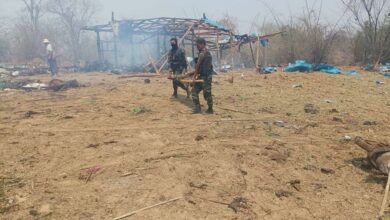Odesa tenor swaps tux for camouflage nets to fight Russia

By María Traspaderne
Odesa, Ukraine, Mar 29 (EFE).- After making his way past checkpoints bolstered with sand-bags and anti-tank hedgehogs lining Odesa’s streets, Vladislav Goray fixes his eyes on the opera building where he first sang.
The tenor has, for now, hung up his tuxedo, and dedicates his time to transporting camouflage netting.
After the war, he says, his country and Russia will be enemies “for years.”
It’s a sunny day in the southern Ukrainian city, which sits on the shores of the Black Sea and is braced for a possible Russian assault.
Goray is reflecting on one of the city’s jewels, the opera house, which he knows like the back of his hand. Since his 1993 debut there with a performance of The Barber of Seville, Giray has since taken part in innumerable shows.
The neo-Baroque building is now lined with white sand bags and no-one is allowed inside.
Goray looks at the opera house and lets out a sigh.
“What do you think when you see it?,” Efe asks him.
“I think that this great beauty was created by architects with a lot of talent and at any given moment, it could be destroyed.”
Goray has showcased his singing talents in 37 different countries, including at London’s Royal Albert Hall, but it is Odesa’s opera house that means the most to him.
“It’s not because I worked there, but because it is part of World Heritage, it belongs to everyone. It makes me want to cry,” he says of the building that withstood Nazi Germany’s onslaught for 73 days.
Odesa is a cultural hub in Ukraine, its streets lined with museums and music schools.
One local saying sums it up: “If a child in Odesa is walking down the street without a violin case, that simply means he plays piano.”
Goray no longer goes to the opera house, although he keeps his tuxedo in mint condition for the odd television performance. Nowadays, each morning, he heads to a center where a small army of volunteers weave camouflage netting, elbow to elbow in a basement room of a typical Odesa building.
Among them is Goray’s mother, who, like him, is originally from Malyn, a town near Kyiv that has come under Russian bombardment on four occasions.
“There is nothing military there,” Goray tells Efe. But Russian troops nonetheless destroyed the music school where he studied, and where his mother worked for 50 years as a choir director.
The improvised Odesa workshop has been providing material for Ukraine’s army since war broke out in the Donbas in 2014.
For Goray, the fight against Russia is necessary to safeguard a way of life.
“That’s why we resist with such strength. We don’t want to live like they do in Russia. It’s a fight between two different mentalities. We will never bend to the Russians, we want to be free.”





